
Anatoly Yevgenyevich Karpov is a Russian and former Soviet chess grandmaster, former World Chess Champion, and politician. He was the 12th World Chess Champion from 1975 to 1985, a three-time FIDE World Champion, twice World Chess champion as a member of the USSR team, and a six-time winner of Chess Olympiads as a member of the USSR team. The International Association of Chess Press awarded him nine Chess Oscars.
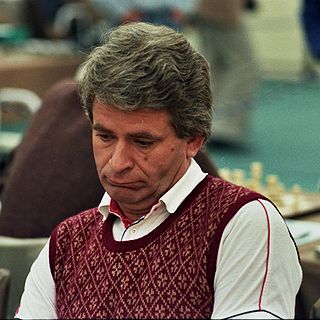
Boris Vasilievich Spassky is a Russian chess grandmaster who was the tenth World Chess Champion, holding the title from 1969 to 1972. Spassky played three world championship matches: he lost to Tigran Petrosian in 1966; defeated Petrosian in 1969 to become world champion; then lost to Bobby Fischer in a famous match in 1972.
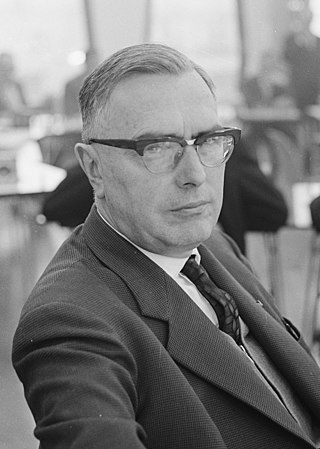
Machgielis "Max" Euwe was a Dutch chess player, mathematician, author, and chess administrator. He was the fifth player to become World Chess Champion, a title he held from 1935 until 1937. He served as President of FIDE, the World Chess Federation, from 1970 to 1978.

Mikhail Nekhemyevich Tal was a Soviet and Latvian chess player and the eighth World Chess Champion. He is considered a creative genius and is widely regarded as one of the most influential players in chess history. Tal played in an attacking and daring combinatorial style. His play was known above all for improvisation and unpredictability. Vladislav Zubok said of him, "Every game for him was as inimitable and invaluable as a poem".

Paul Keres was an Estonian chess grandmaster and chess writer. He was among the world's top players from the mid-1930s to the mid-1960s, and narrowly missed a chance at a World Chess Championship match on five occasions. As Estonia was repeatedly invaded and occupied during World War II, Keres was forced by the circumstances to represent the Soviet Union and Nazi Germany (1941–44) in international tournaments.

Leonid Zakharovych Stein was a Soviet chess Grandmaster from Ukraine. He won three USSR Chess Championships in the 1960s, and was among the world's top ten players during that era.

Jørgen Bent Larsen was a Danish chess grandmaster and author. Known for his imaginative and unorthodox style of play, he was the second-strongest non-Soviet player, behind only Bobby Fischer, for much of the 1960s and 1970s. He is considered to be the strongest player born in Denmark and the strongest from Scandinavia until the emergence of Magnus Carlsen.

Oscar Roberto Panno is an Argentine chess Grandmaster. Panno was the first world-class chess player born in South America.
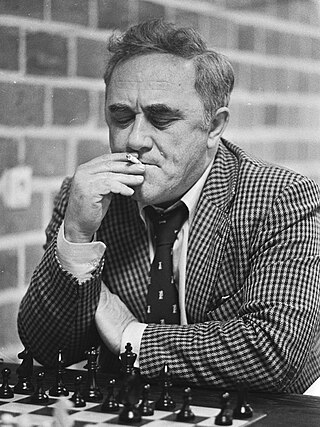
Efim Petrovich Geller was a Soviet chess player and world-class grandmaster at his peak. He won the Soviet Championship twice and was a Candidate for the World Championship on six occasions. He won four Ukrainian SSR Championship titles and shared first in the 1991 World Seniors' Championship, winning the title outright in 1992. His wife Oksana was a ballet dancer while his son Alexander was also a chess master. Geller was coach to World Champions Boris Spassky and Anatoly Karpov. He was also an author.
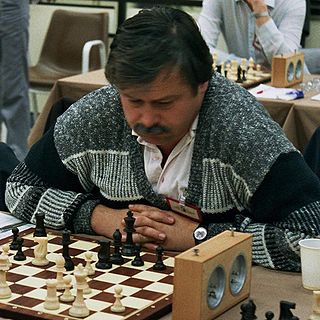
Vlastimil Hort is a Czechoslovak and later German chess Grandmaster. During the 1960s and 1970s he was one of the world's strongest players and reached the 1977–78 Candidates Tournament for the World Chess Championship, but never qualified for a competition for the actual title.

Albéric Joseph Rodolphe Marie Robert Ghislain O'Kelly de Galway was a Belgian chess Grandmaster (1956), an International Correspondence Chess Grandmaster (1962), and the third ICCF World Champion in correspondence chess (1959–1962). He was also a chess writer.

Igor Zakharovich Bondarevsky was a Soviet Russian chess player, trainer, and chess author. He held the title of Grandmaster in both over-the-board and correspondence chess. Bondarevsky shared the 1940 Soviet title, and later coached World Champion Boris Spassky.

Iivo Nei is an Estonian chess master.

Hermann Pilnik was a German-born Argentine chess Grandmaster.

Lothar Maximilian Lorenz Schmid was a German chess grandmaster. He was born in Radebeul in Saxony into a family who were the co-owners of the Karl May Press, which published the German Karl May adventure novels.

Lodewijk Prins was a Dutch chess player and referee of chess competitions.
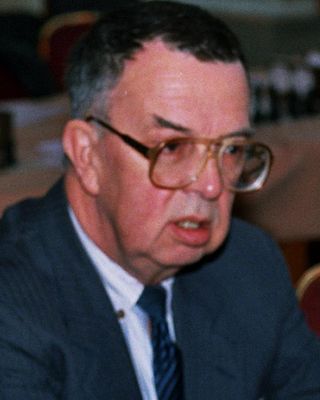
Nikolai Vladimirovich Krogius was a Russian chess Grandmaster, International Arbiter (1985), psychologist, chess coach, chess administrator, and author. He won several tournament titles at Sochi and in Eastern European events, and appeared in seven Soviet finals from 1958–71. His peak was in 1967 when he ranked 18th in the world for a time. He earned his doctorate in psychology, and specialized in sports psychology. He coached World Champion Boris Spassky for several years, also served as chairman of the USSR Chess Federation, and co-authored five chess books. He was the co-winner of the 1993 World Senior Chess Championship.

Arturo Pomar Salamanca was a Spanish chess player. He was the first Spanish player to be awarded the title of grandmaster (GM), and was a seven-time national champion.

Helmut Pfleger is a German chess grandmaster and author. He was one of the most promising chess players in the 1960s and 1970s. From 1977 until 2005, Pfleger hosted a series of chess programs on German public TV, including Chess of the Grandmasters, often together with grandmaster Vlastimil Hort. By profession, he is a doctor of medicine.




















